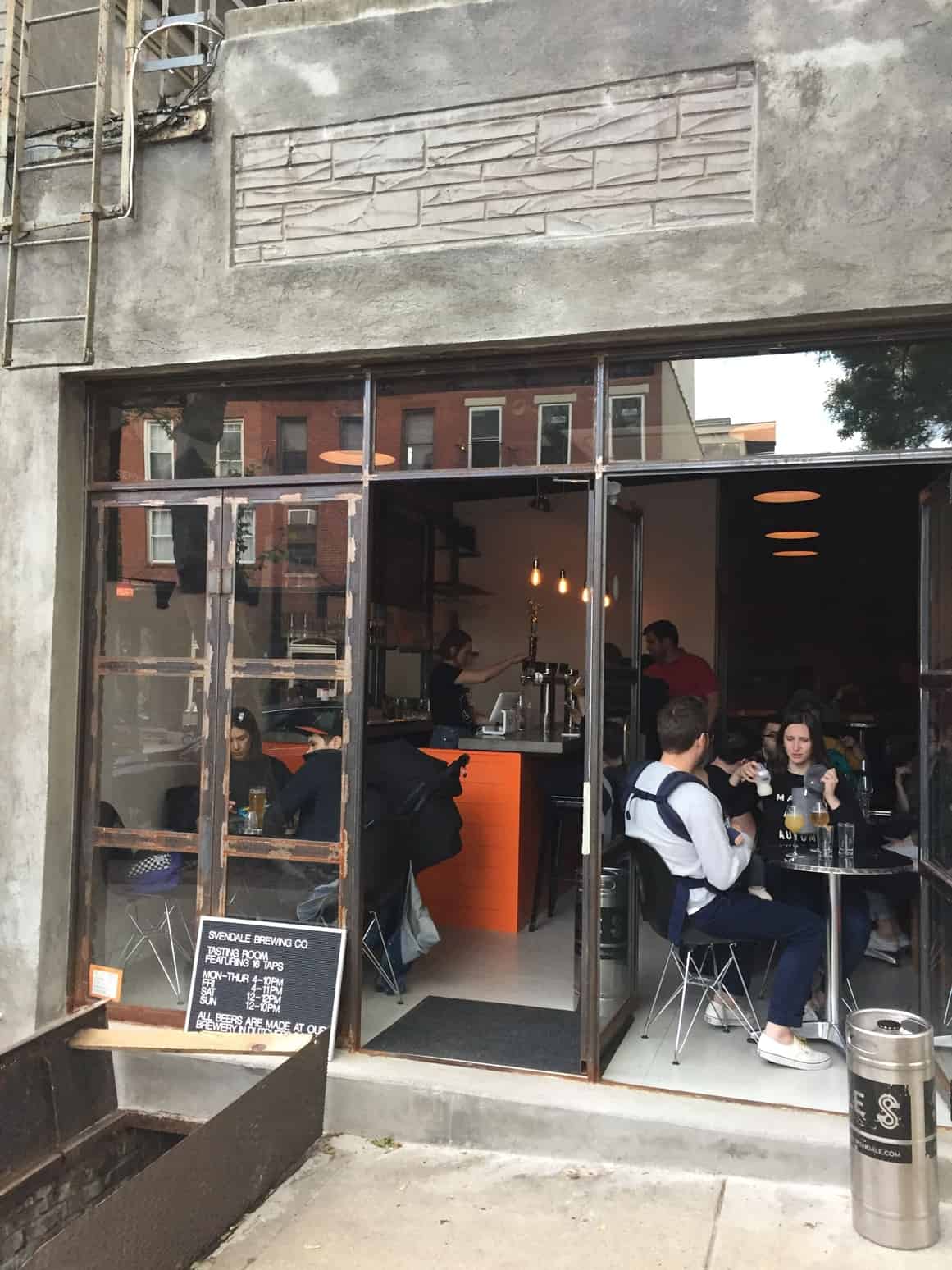For many beer enthusiasts, the greatest adventures are bucolic escapes to farmhouse breweries in Vermont’s remote Northeast Kingdom or the Blue Ridge Mountains of Western North Carolina, where, with monastic dedication, bearded bohemian hillbillies craft organic small-batch ales of such dignity and freshness that they seem almost healthful. But you need a car to get there.
Fortunately, in February, Svendale Brewing Co., based in rural Millerton, New York, opened a small off-site taproom in Carroll Gardens. It looks like any other new yuppie bar, but with some imaginative work and a liberal sampling of the beer, one can mentally remove oneself from Brooklyn and picture instead rolling grassland, a light snowfall over the Taconic Range, or the sapphire of an unpolluted northerly segment of the Hudson River.
At 486 Court Street, the Svendale Brewing Co. Tasting Room offers 14 taps of rotating house beer, plus two for wine from an adjacent Upstate vineyard. For prices between $4 and $9, customers can choose pours of four, eight, 12, or 16 ounces. I visited with my brother, and together we tried six brews in the medium-large or large format (for the sake of a fair and informed evaluation).
Four of them were sours, which speaks more to our personal preferences than to a deficit of other options. These were the Lazy Garden Botanical Sour, a lightly herbal beer flavored with angelica root; the refreshing Sunset Sour Orange Wit; the convincingly fruity Hellblau Blueberry Berliner; and the Stick Shift Sour IPA, more sour than IPA.
The Stunt Rider Raspberry Hibiscus IPA, meanwhile, earned its categorical designation even as it bore the appearance of ruby red grapefruit juice and a mellow floral character in place of the usual blast of hoppy bitterness. The Cafe Mocha Milk Stout managed to avoid the sweet, sludgy character that its name seemed to suggest as a worrying possibility.
Svendale is a short walk up Court Street from the better-known Other Half Brewing, which draws long lines whenever it schedules a new can release. Svendale doesn’t have a retail business, but it has “crowlers” for takeaway customers, sealing individual cans of draft beer in open view just behind the bar in real time. According to the bartender, some tourists who visit Other Half subsequently wander up to Svendale, but the differences between the two operations are considerable.
Other Half’s near-exclusive lineup of double IPAs and boozy stouts, which regularly exceed 10 percent alcohol by volume, orients itself around the extreme palate of the zealous online “beer geek”; in Svendale’s gentler approach, the highest ABV at the moment is 8.2 percent. It might be nice to see more Belgian or English styles in the rotation, but the offerings at Svendale already have a degree of eclecticism and a graceful style that don’t appear rooted in an effort to achieve the highest BeerAdvocate user rating in every case.
On the other hand, Svendale’s generic contemporary interior – metal stools and Edison bulbs – might benefit from a little more particularity. It feels, alas, like Brooklyn (where its owner actually lives), not Millerton, wherever that may be.
If the interior design doesn’t come from Upstate, at least the ingredients do. Svendale has a New York State Farm Brewery license. Any brewer in the state can receive one as long as 60 percent of their ingredients come from New York State farms. Besides water, the primary ingredients in beer, traditionally, are hops, yeast, and malted barley.
Governor Cuomo introduced the program in 2012 to encourage brewers to buy local, which would create a stimulus for New York agriculture. In the early 20th century, New York grew more hops than anywhere else in the country, but Prohibition forced farmers to turn their attention elsewhere. When Prohibition ended, Washington and Oregon took the lead. The Farm Brewery law seeks to help New York reclaim a portion of the industry.
Sold at a discount, the Farm Brewers license provides other perks, including the right to open satellite taprooms like Svendale’s; antitrust regulations otherwise prohibit breweries from owning bars in New York, although, as of 2014, they can sell pints inside their own brewing facilities, as Other Half does.
In 2012, it was tough to make locally sourced beer in New York because farmers hadn’t yet adjusted to the new demand. Legally, a Farm Brewery could get by with 20 percent in-state ingredients at first.
Things have changed, and in 2019 the law upped the requirement to 60 percent (including 60 percent of the hops). In 2024 it’ll increase to 90 percent. Breweries like Svendale will adjust accordingly; ideally, the law will only make their beer – brewed without the popular varieties of hops unique to the Pacific Northwest, relying on different flavors instead – more distinctive.
Svendale is open daily. It doesn’t have a kitchen, so customers can bring outside food into the bar or buy a bag of chips for $2 or pistachios for $4.









